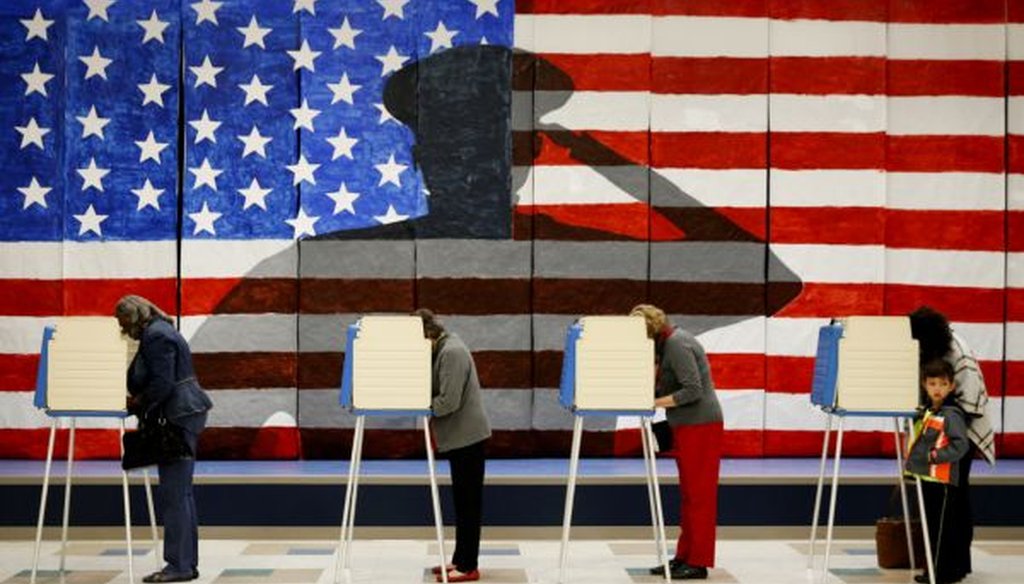Stand up for the facts!
Our only agenda is to publish the truth so you can be an informed participant in democracy.
We need your help.
I would like to contribute

Voters line up in booths to cast their ballots at Robious Elementary School in Chesterfield, Va. on Nov. 8, 2016. (AP)
After Hillary Clinton won the popular vote but Donald Trump won the Electoral College, activists renewed a push to revamp the system by which the presidency is awarded.
An article posted on the progressive website The Daily Kos described the effort this way:
"Eliminating the Electoral College does not even require a constitutional amendment. An effort known as The National Popular Vote Interstate Compact is an agreement among several U.S. states and the District of Columbia to award all their respective electoral votes to whichever presidential candidate wins the overall popular vote. Once states totaling 270 electoral votes join the compact -- which only requires passing state laws -- then the next presidential election will be determined (by) the popular vote, not the Electoral College."
Is it possible to eliminate the Electoral College without amending the Constitution?
We wanted to get to the bottom of that claim. Little did we know we were diving into a legal nerd fest.
We aren’t going to referee all of the arguments about the practical implications and the potential pitfalls of changing how we elect the president. But we will summarize some of the key arguments. Ultimately, we found that the proposal makes sense in concept, but it’s not clear whether courts would allow the plan to go forward.
National Popular Vote Interstate Compact
Amending the constitution to change the way we elect the president would be difficult. It requires require a two-thirds vote by the House and Senate and support from three-fourths of state Legislatures. Since that is a high threshold, advocates for electing the president based on the national popular vote have looked for other paths.
Under the current system, voters cast ballots for candidates, but it is electors from each state who elect the president when the Electoral College convenes. The Constitution assigns each state a number of electors based on the state’s population. The total number of electors is 538.
After Al Gore won the popular vote but lost in 2000, legal scholars (brothers Akhil Reed Amar and Vikram David Amar, both Yale Law graduates, and separately Northwestern law professor Robert W. Bennett) wrote about the idea of directly electing the president through the national popular vote.
The most popular idea is for states to coordinate to assign their electors to the winner of the national popular vote. The concept gained steam in 2006 when John R. Koza, a computer scientist and former Stanford consulting professor, wrote a 620-page proposal to create the National Popular Vote Interstate Compact.
Here’s how the compact works: states Legislatures pass laws agreeing to award their electoral votes to the candidate who wins the national popular vote, but it only kicks in when enough states sign on to add up to 270 electoral votes.
"It would be an end run around the Electoral College as opposed to abolishing it," Pepperdine University law professor Derek Muller told PolitiFact. "There are still 538 electors who are still going to meet late December -- the Electoral College still exists -- but it would be operating in a very different way."
Over a decade, 10 states and the District of Columbia -- which add up to 165 electoral votes -- have passed laws to join the compact. So 105 more electoral votes are needed before it can go into effect.
The current states in the compact are Hawaii, Illinois, Maryland, Massachusetts, New Jersey, Washington, Vermont, California, Rhode Island and New York.
Advocates argue that it is a way to make every vote count and will take the campaigns’ emphasis off a small number of battleground states such as Ohio and Florida. Opponents of the compact argue that the states shouldn’t circumvent the electoral college without federal consent.
So far, this is a hypothetical debate. The compact has been passed by blue states, and some experts say it is unlikely that enough red or purple states will sign on to get to 270. Battleground states such as Florida might be the most disinclined to join something because they are heavily courted under the current system.
Congressional consent
But that still leaves a key question: If the compact ever got to that 270-threshold, could states award their electoral votes to the national popular vote winner, or would Congress need to sign off?
If the compact ever meets that benchmark, it’s likely that someone would file a challenge. It’s likely the U.S. Supreme Court would have to rule on whether the system is permissible.
The Compact Clause of the Constitution states that "no state shall, without the consent of Congress enter into any agreement or compact with another state, or with a foreign power." The courts have ruled in the past that if federal supremacy is threatened, then congressional consent is required for a compact to be valid.
Interstate compacts were intended to deal with issues that cross state boundaries, such as with bridges, radioactive waste and water. Some have required congressional consent, while others haven’t.
The question is how consent would be applied to a compact about electing the president.
Koza argues that this process is legal because Article 2 of the Constitution spells out that states can award their electors in the way they see fit. All but two -- Maine and Nebraska -- have laws that award all their electors to one candidate.
But some lawyers have disagreed with Koza’s conclusion and argue that Congress would have to approve, or that it would be best practice to do so.
Tara Ross, lawyer and author of Enlightened Democracy: The Case for the Electoral College, argues that the compact at a minimum requires congressional consent.
"If ever a compact encroached on federal and state sovereignty, this is it," she wrote in a 2010 paper for the conservative Federalist Society. "If the NPV compact goes into effect, its proponents will have effectively changed the presidential election procedure described in the Constitution, without the bother of obtaining a constitutional amendment."
The Amar brothers argue that Congress should have a say. "Congress needs to be involved, because it involves a process in which people in every state are going to be voting," Akhil Reed Amar told PolitiFact.
Our conclusion
Ten states and the District of Columbia have signed on to the National Popular Vote Interstate Compact, in which states agree to award all their electoral votes to the winner of the national popular vote. The compact only takes effect when states totalling 270 electoral votes sign on, and so far the effort still falls short of that.
This plan would not eliminate the Electoral College, but it would dramatically alter its purpose, because electors would cast their votes based on the national popular vote. Battleground states would become obsolete, and candidates would concentrate on winning the most number of votes nationwide.
If enough states ever sign on, the plan would likely face a court challenge, with the Supreme Court getting to rule on whether the plan passes constitutional muster. That’s a future scenario we can’t predict.
Our Sources
The Daily Kos, "Sign the petition: Abolish the Electoral College," Nov. 2016
National Popular Vote, Website, Accessed Nov. 16, 2016
National Popular Vote, News History, Accessed Nov. 16, 2016
National Popular Vote, "Myths about interstate compacts," Dec. 31, 2015
National Popular Vote, "Myths about constitutionality," Dec. 29, 2015
National Popular Vote, "Background about interstate compacts," 2006
New York Times Opinion Page, "Should the Electoral College Be Abolished?" Nov. 16, 2016
Washington Post The Monkey Cage, "The electoral college has serious problems. So do any alternatives," Nov. 15, 2016
New York Times, "States Try to Alter The Way Presidents Are Elected," Aug. 11, 2007
Georgetown Law Journal by Vikram David Amar, "Response: The Case for Reforming Presidential Elections by Subconstitutional Means: The Electoral College, the National Popular Vote Compact, and Congressional Power," 2011
Akhil Reed Amar and Vikram David Amar, "How to achieve direct national election of the president without amending the constitution," Dec. 28, 2001
Election Law Journal article by professor Derek Muller, "More Thoughts on the Compact Clause and the National Popular Vote: A Response to Professor Hendricks," 2008
Fivethirtyeight, "Why a Plan to Circumvent the Electoral College Is Probably Doomed," April 17, 2014
The Council of State Governments, "Congressional Consent and the Permission for States to Enter into Interstate Compacts," June 2011
Article by Robert W. Bennett, "Popular Election of the President Without a Constitutional Amendment," 2001
The Federalist Society article By Tara Ross, "Federalism & Separation of Powers," 2010
Interview, John Koza, chair of the National Popular Vote Inc, Nov. 16, 2016
Interview, Pat Rosenstiel, spokesman for National Popular Vote Inc., Nov. 16, 2016
Interview, Akhil Reed Amar, Yale University professor of law and political science and visiting adjunct professor at Columbia Law School, Nov. 16, 2016
Interview, Vikram David Amar, University of Illinois College of Law dean, Nov. 16, 2016
Interview, Michael P. McDonald, University of Florida political science professor, Nov. 16, 2016
Interview, Derek Muller, Pepperdine University law professor, Nov. 15, 2016
Interview, Rob Richie, FairVote executive director, Nov. 16, 2016
Interview, Colmon Elridge, Director of The Council of State Governments National Center for Interstate Compacts, Nov. 16, 2016












































